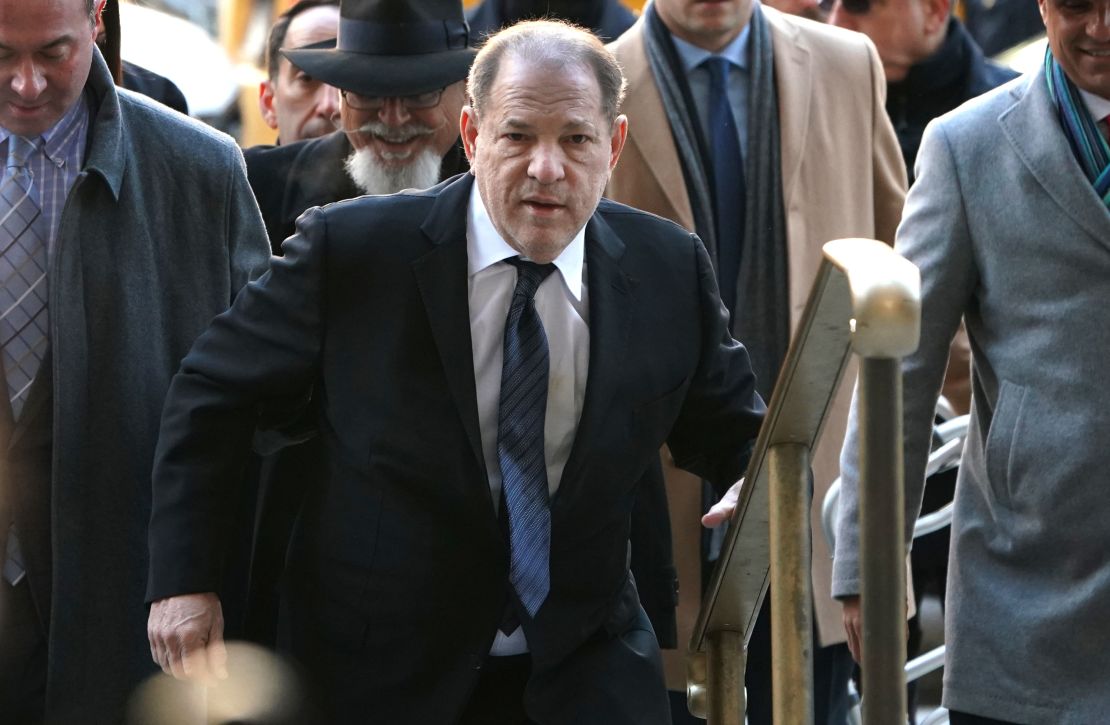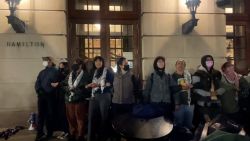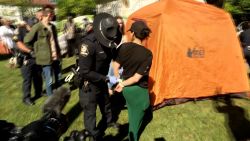An older man once atop the world of entertainment hobbles into court to face sexual assault charges as his attorneys prepare to sharply attack the credibility of women who testify about their trauma.
That scene neatly sums up Bill Cosby’s criminal case, and – as we learned over the past week – closely mirrors Harvey Weinstein’s ongoing rape and sexual assault trial in New York.
Weinstein’s and Cosby’s cases bear deep resemblances: dated accusations without supporting forensic evidence, an aggressive defense cross-examination strategy, even testimony from the same expert state witness.
Weinstein, of course, is hoping for a different outcome.
Though Cosby’s first trial ended in a hung jury, he later was convicted of aggravated indecent assault and sentenced to three to 10 years in prison for drugging and sexually assaulting someone he knew. Weinstein has pleaded not guilty to five charges, including first-degree rape and predatory sexual assault, which can carry a punishment of life in prison.
There is, however, one major difference between these cases: The women in Cosby’s trial said they were assaulted after being drugged, while the women in Weinstein’s trial make no mention of drugs. It’s an important distinction, legal experts told CNN, and goes to the heart of defense attorneys’ questions about whether the women consented to these sexual encounters.
“I think it is harder for a jury to deal with an adult woman who by her own volition goes to this hotel room and then sexual advances or conduct (is) forced on her,” said Michelle Simpson Tuegel, an attorney who represents victims of sexual assault. “That happens, I don’t doubt that that happens. … But I think societally, we’re still behind in that area.”
Here’s a look at the cases’ similarities and key difference, and what those may mean going forward.
Defense strategy is to attack
Both Cosby’s and Weinstein’s cases are based on accusations that date back years and were not immediately reported to police. Without forensic evidence to bolster their arguments, the credibility of the women’s testimony takes center stage.
Because of that, Cosby’s defense team sharply attacked his accusers, and Weinstein’s team looks to be doing the same.
Cosby’s trial was based on accusations by Andrea Constand, a Temple University employee who said Cosby drugged and then assaulted her at his home.
In court, defense attorney Tom Mesereau dismissed Constand as a “pathological liar” and a “con artist” who was after Cosby’s money. In cross-examination, Mesereau worked to show inconsistencies in her story and got Constand to admit she was “mistaken” about the date of the attack.
Cosby’s defense team also challenged the testimony of five “prior bad acts” witnesses who testified that Cosby had drugged and assaulted them years earlier. The cross-examination of Janice Dickinson, the model and reality show figure, became particularly testy when Mesereau pointed out she hadn’t mentioned any assault in her memoir describing her meeting with Cosby.
“I wasn’t under oath when I wrote that book,” she testified.
“So, you lied to get a paycheck?” Mesereau asked.
“Don’t call me a liar,” Dickinson said.
Weinstein is charged with first-degree criminal sexual act, first-degree rape and third-degree rape directly related to alleged attacks on Miriam Haley in 2006 and Jessica Mann in 2013. He also is charged with predatory sexual assault in connection with both of those alleged incidents, backed by testimony from Haley, Mann and actress Annabella Sciorra.
Sciorra became the first to testify when she accused Weinstein of raping her in the winter of 1993-94. On cross-examination, defense attorneys pressed Sciorra on her lack of memory on specific details and dates.
In opening statements, attorney Damon Cheronis had said the defense planned to highlight the “inconsistencies” in each woman’s story. He said he realized the cross-examinations could come off as rude or victim-shaming, but he called them necessary to show “another side” to the story.
“What we plan on doing is not victim-shaming anyone. If there is anything I said during the course of the opening statement that you disagree with, just remember I am not here to beat anyone up, neither are my partners,” he said. “We are here to ask questions that have never been asked.”
Multiple ‘prior bad acts’ witnesses
Both Cosby’s and Weinstein’s trials also feature several “prior bad acts” witnesses whose testimony is not related directly to any criminal charges.
Prosecutors use these witnesses to argue that the defendant had a specific pattern of behavior. In general, “prior bad acts” witnesses aim to strengthen the prosecution’s case, particularly in a “he said-she said” sexual assault trial with limited physical evidence.
“The purpose of introducing the ‘other acts’ evidence is to cut against the idea that this is a one-off, ‘he said-she said’ where he could have reasonably thought that she was consenting to what was going on,” Michelle Madden Dempsey, a former prosecutor and a law professor at Villanova University, has told CNN.
These witnesses also matter on a human level, Simpson Tuegel told CNN.
“From a legal perspective, (their value) is the identifiable common pattern of his behavior,” she said. “But from the human perspective, it’s all these women who are coming in and have actually been traumatized and are exhibiting that and are able to give details and show how this has impacted them and their lives in a way that is very difficult to manufacture.”
“Prior bad acts” witnesses were particularly important in Cosby’s case. In his first trial, only one “prior bad acts” witness was permitted to testify. But in his second trial, five such witnesses testified that Cosby gave them a pill, incapacitating them, then assaulted them. The jury returned a guilty verdict.
Montgomery County, Pennsylvania, prosecutor Kevin Steele, who handled Cosby’s case, highlighted the importance of these witnesses immediately after the guilty verdict in 2018.
“I think everybody got to see who he really is when each of those ‘prior bad act’ witnesses got to testify,” he said.
Weinstein’s trial is expected to feature testimony from three “prior bad acts” witnesses, known as Molineux witnesses in the New York legal system.
These witnesses, Assistant District Attorney Meghan Hast said in openings, will show how Weinstein “lured truly innocent women into (his) exclusive company before pouncing.”
Hast said the women – Dawn Dunning, Tarale Wulff and Lauren Young – all were young, aspiring actresses who met Weinstein with hopes of furthering their careers. Weinstein then lured them into meetings in private rooms, where he sexually harassed or assaulted them, Hast alleged.
Defendant has visible health issues

One clear similarity between Weinstein and Cosby is that both have arrived to court with visible health problems.
Cosby, who is legally blind, came to court using a cane and holding the arm of an aide, friend or family member. During his first trial in 2017, several fellow actors and friends escorted him into court as a show of support.
Weinstein, 67, has arrived to court using a walker after undergoing back surgery shortly before the start of the trial. In the past week, he has eschewed the walker and relied on support from aides and members of his defense team.

His attorney, Donna Rotunno, said in December that his back injury was painful and that he must use the walker for his own safety.
“We wanted him to use a walker last week, and Mr. Weinstein didn’t want the press to think he was seeking sympathy. He is in pain, he’s having surgery, and we will be back in court on January 6 for trial,” she said then.
Prosecutors rely on the same expert witness
The two cases even share the same expert testimony for the prosecution.
Dr. Barbara Ziv, a forensic psychiatrist, testified during Cosby’s trial about several “rape myths,” contrasting how sexual assault victims actually behave with how society believes they behave. Speaking generally, she said “delayed reporting” to authorities is common and it is not unusual for victims to interact with an attacker after an assault.
“Delayed reporting can go from days to weeks to months to years,” she said then. “We blame victims for not being the kind of victim that we think they should be. It’s part of the rape myth that victims report promptly and display a certain set of symptoms.”
Ziv’s testimony was important to the case because Constand, a Temple University employee, repeatedly had contact with Cosby after the assault. Constand first told police about the incident in 2005, more than a year afterward. Cosby’s defense attorneys had argued the incident was consensual and Constand’s extensive contact with Cosby and reporting delay showed she was after his money.
Prosecutors in Weinstein’s trial put Ziv on the stand on Friday to make similar arguments about these rape myths as they try to undercut the defense.
Weinstein’s defense team has pointed out that the women did not tell police about the attacks for years or, in Sciorra’s case, decades. In addition, his defense has highlighted what it called “loving” text messages and emails between the women and Weinstein to try to argue that their sexual interactions were consensual.
A major difference: The question of consent
The two trials do have one vital difference surrounding consent, the all-important issue in any rape and sexual assault trial.
In Cosby’s trial, Constand and the prior bad acts witnesses all reported that they had been drugged by Cosby and rendered incapacitated, which made them unable to fight back or resist his advances.
In Weinstein’s trial, Haley, Mann and Sciorra have said they did try to fight off his attacks but were physically overpowered.
That distinction between being drugged and being overpowered is significant, Cheryl Bader, a former prosecutor and Fordham University Law School clinical associate professor, told CNN.
“The allegations in the Cosby case involved these women being drugged and being incapacitated to consent,” she said. “The issue here (in the New York case) is whether these women consented in order to further their career or whether the physical force and the sheer intimidation of Harvey Weinstein … constitutes forcible compulsion.”
Juries – and society writ large – are generally more apt to believe victims who are underage or incapacitated by drugs or alcohol, said Simpson Tuegel, the victims attorney.
“We’re more willing to accept that a child was taken advantage of, or someone was so incapacitated they couldn’t say no,” she said. “But without the alcohol or the underage element, it’s just another step where I really think society is still struggling.”
Simpson Tuegel has seen this first-hand in her work representing women who are assault or rape victims, she said.
“The women I have found to be very credible,” she said, “but it is a ‘he said-she said,’ and it is a harder case for the prosecution in that respect than if the person were incapacitated or a child.”


























